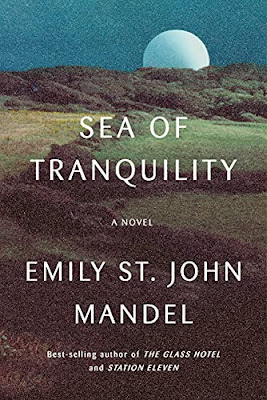Book links: Amazon, Goodreads
AUTHOR INFO: Emily St. John Mandel was born and raised on the west coast of British Columbia, Canada. She studied contemporary dance at the School of Toronto Dance Theatre and lived briefly in Montreal before relocating to New York.
She is the author of five novels, including The Glass Hotel (spring 2020) and Station Eleven (2014.) Station Eleven was a finalist for a National Book Award and the PEN/Faulkner Award, won the Morning News Tournament of Books, and has been translated into 34 languages. She lives in NYC with her husband and daughter.
Publisher: Knopf (April 5, 2022) Page count: 276 pages
Mandel’s writing style has that wonderfully melancholic atmosphere I can’t resist. I understand why some readers don’t like it (slow, episodic, usually without a clear ending), but I love it.
Sea of Tranquility is one of the most intriguing titles I’ve read this year. Mandel combines pandemic imagery with science fiction themes (time travel) and metaphysics. As always, she excels at writing beautifully observed vignettes from people’s lives that give her characters depth and make them so memorable. I like to think of them as still images of raw humanity.
The story follows a few characters and timelines (from early 20th century Canada to the 23rd century Lunar Colony). Exiled to Canada by his family, Edwin St. Andrew experiences a strange phenomenon in 1912. While walking in the forest, he suddenly hears violin music and people. But how can this be when there’s no one else in the forest?
In another timeline, in the 2020s, Paul James Smith composes music inspired by a video recorded by his late half-sister Vincent (familiar to readers from Mandel’s The Glass Hotel). The footage contains a bizarre phenomenon - the screen goes black, and sounds including violin tones, static, and train station noises, appear out of nowhere.
In yet another timeline, in 2203, author Olive Llewellyn leaves her home on the moon’s second colony to promote her “pandemic novel” on Earth. Bad timing - it seems a new virus is spreading on Earth. Interestingly, she also experiences something strange while listening to violin music.
Finally, in 2401, the disruption of the time continuum disturbance experienced by Edwin, Vincent, and Olive alarms the powerful Time Institute. They send one of their investigators, Gaspery-Jacques Roberts, back in time to find out more about it.
As Edwin, Gaspery, and others scattered across time experience similar visions, we settle in for a genre-bending story. Mandel plays with sci-fi tropes, but she's more interested in human relationships and their consequences than the mechanics of time travel or the science behind lunar colonies.
As mentioned, I love Mandel's writing style. Not only is her prose concise and sharp, she also manages to simply discuss difficult topics and offer an interesting point of view on them. Like, when Olive discusses people's fascination with post-apocalyptic fiction and states the following:
“I think it’s a kind of narcissism. We want to believe that we’re uniquely important, that we’re living at the end of history, that now, after all these millennia of false alarms, now is finally the worst that it’s ever been, that finally we have reached the end of the world.”
The book jumps across time. All of the time. The further we get, the more sense it makes. The Time Institute has its plans for humanity, but it hasn't figured out how to control people's free will. And so the characters find their way to helping loved ones, trying to save the world, or simply showing kindness to a stranger.
Sea of Tranquility isn't Station Eleven or The Glass Hostel. It has Mandel's signature (and superb!) style but any comparisons won't serve anyone. Although it can be read as a stand-alone book, I recommend starting it after reading The Glass Hotel because there are subtle connections between the two novels.
Sea of Tranquility isn't Station Eleven or The Glass Hostel. It has Mandel's signature (and superb!) style but any comparisons won't serve anyone. Although it can be read as a stand-alone book, I recommend starting it after reading The Glass Hotel because there are subtle connections between the two novels.


No comments:
Post a Comment